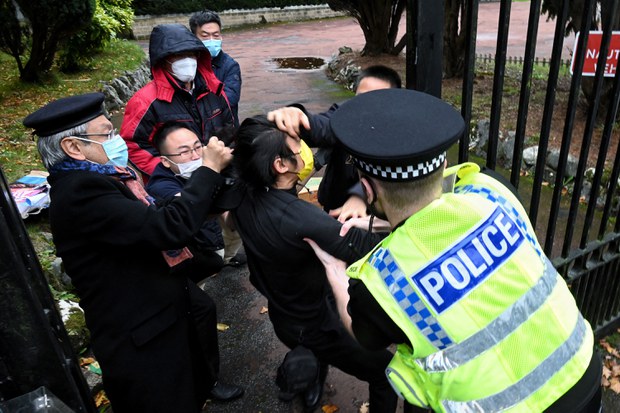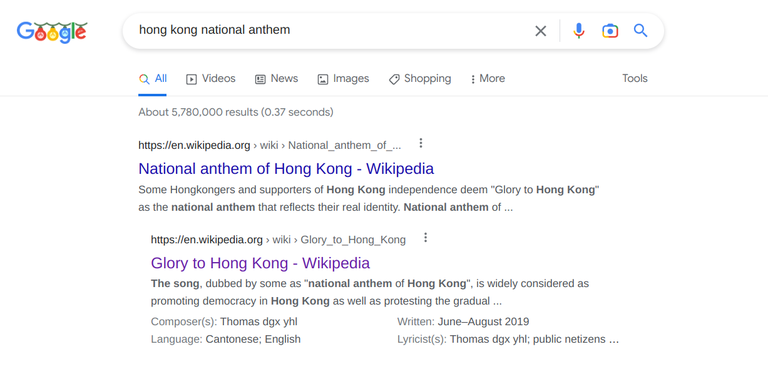China recalls six diplomats asked to waive immunity over Manchester consulate attack
Share

China has withdrawn six of its diplomats from the United Kingdom, including a consul general who admitted to assaulting a Hong Kong protester inside the Chinese consulate in Manchester, British Foreign Secretary James Cleverly said on Wednesday.
The move came after the British government requested that six Chinese officials waive diplomatic immunity by Wednesday, so they could be questioned by Manchester police regarding the attacks on protester Bob Chan.
Instead, China had withdrawn all six diplomats ahead of the deadline, he said.
“As part of that investigation, we requested that six Chinese officials waive diplomatic immunity so they can be questioned,” Cleverly said. “In response to our requests, the Chinese government has now removed from the UK those officials, including the consul-general himself.”
China’s consul general in the northern British city of Manchester admitted on Oct. 20 to assaulting a Hong Kong pro-democracy protester inside the grounds of the diplomatic mission as a peaceful protest on Oct. 16 gave way to attacks.
“It’s my duty”
Consul General Zheng Xiyuan told Sky News after the attack that he was the gray-haired man in a hat seen on social media footage pulling the hair of protester Bob Chan, adding that he and several other consular staff members filmed beating Chan were “trying to control the situation.”
Asked again if he pulled Chan’s hair, Zheng responded: “Yes … because he abused my country, my leader. I think it’s my duty.”
Several men, not all of whom have been identified, set about beating up Chan, who was only pulled to safety because a police officer decided to risk setting foot on consular grounds.
“I am disappointed that these individuals will not be interviewed or face justice,” Cleverly said in a written statement cited by Reuters. “Nonetheless, it is right that those responsible for the disgraceful scenes in Manchester are no longer — or will shortly cease to be — consular staff accredited to the UK.”
A Chinese embassy spokesperson in London confirmed that the officials were leaving, but said it was due to the “normal rotation of Chinese consular officials.”
The attacks came after Hong Kong protesters set up banners containing Cantonese expletives targeting the Chinese Communist Party’s 20th National Congress in Beijing on the street just outside the consulate gates.
The embassy spokesperson said the Oct. 16 protest was a “violent disruptive provocation deliberately staged by anti-China elements who assaulted our consulate members and illegally intruded into the consulate premises, gravely undermining the safety and dignity of consulate officials.”
It said the U.K. should have protected consular staff, who were “actually the victims.”
Protest anthem
Beijing typically views any disrespect to its leaders, ruling party or national symbols as a grave affront, and has imposed draconian laws in Hong Kong after soccer fans there booed the national anthem and defaced national emblems and flags during the 2019 protest movement.
Authorities in Hong Kong last month launched a police investigation into the playing of a banned protest anthem at a rugby match in South Korea, while the city’s officials are reportedly putting pressure on Google to suppress search results linking to the song.
A Google Web search using the keywords “Hong Kong national anthem” displayed “Glory to Hong Kong” in top place and above the Chinese national anthem on Wednesday.
Chief Executive John Lee told reporters on Wednesday that it should be possible to pin China’s national anthem to the top of search results for “Hong Kong national anthem,” which currently include the protest anthem “Glory to Hong Kong,” which calls for freedom and democracy.

“We know that it’s technically possible, because you can change the order of search results by paying for advertising, and Google does have ways to remove incorrect information,” Lee said.
Security chief Chris Tang said on Monday that the search results were “hurting the feelings of Hong Kong people,” who found the search results “unacceptable.”
He said Google had refused to act on the request from the Hong Kong government, despite complying with a ruling from a European Union court ordering it to remove inaccurate information from search results, saying it was applying “double standards.”
Radio Free Asia contacted Google for comment on Wednesday, but hadn’t received a reply by the time of writing. The company has previously responded to Hong Kong media inquiries by saying that it won’t depart from its algorithm as a way of ordering search results.
Teenager sentenced
Meanwhile, a court in Hong Kong on Wednesday sentenced a teenager to a training center for insulting China’s national anthem and flag.
Chief magistrate Victor So handed the training center sentence to Chui Hoi-chun, 18, who was convicted of “sedition” and “insulting the Chinese national anthem and flag.” He will likely be held there for at least six months, with the release date based on his conduct up to a maximum of three years.
Chui had earlier pleaded guilty to “acting with seditious intent” under a colonial-era sedition law, in connection with posts he made to the Hong Kong-based forum LIHKG, YouTube and Discord between May 28, 2020 and Sept. 27, 2022.
He also admitted to three counts of “insulting” China’s national symbols, including altering the words to the ruling Communist Party’s national anthem, the “March of the Volunteers.”
His social media posts were judged to be “anti-government,” and including profanities targeting Chinese leaders and people, So said.
Opposition politicians convicted
Chui’s jailing came after three members of Hong Kong’s largest opposition party were sentenced to two and three weeks in prison for “obstructing” security guards during scuffles in the city’s Legislative Council between 2018 and 2020.
Former Democratic Party lawmakers Andrew Wan, Helena Wong and Lam Cheuk-ting were convicted of obstructing security guards, while Wan also pleaded guilty putting more than one ballot in a ballot box and contempt under the Legislative Council (Powers and Privileges) Ordinance.
“The Democratic Party will speak up for Hong Kong citizens resolutely without humbling ourselves or showing disrespect,” the party said in a statement cited by the Hong Kong Free Press. “[We] will continue to serve citizens with the premise of Hong Kong people’s interests.”
Wan, Wong and Lam are also among 47 opposition politicians and democracy activists awaiting trial for “subversion” under a draconian national security law after they took part in a democratic primary election in the summer of 2020, prompting the government to postpone the election and rewrite election rules so only candidates loyal to Beijing could stand.
Translated by Luisetta Mudie. Edited by Malcolm Foster.







